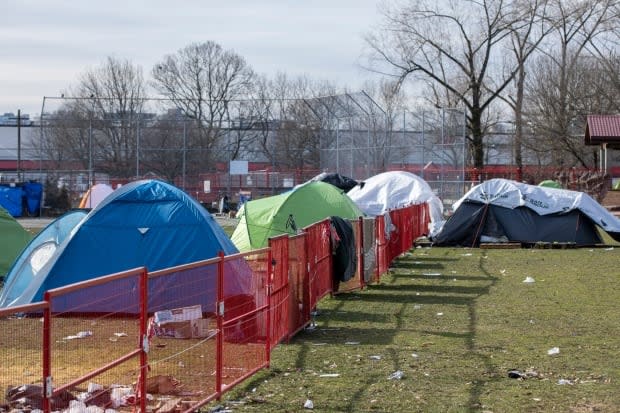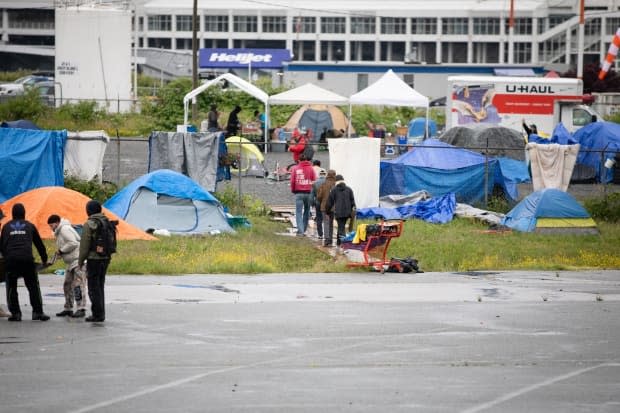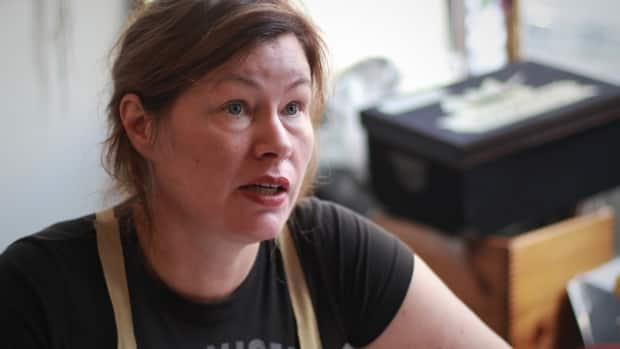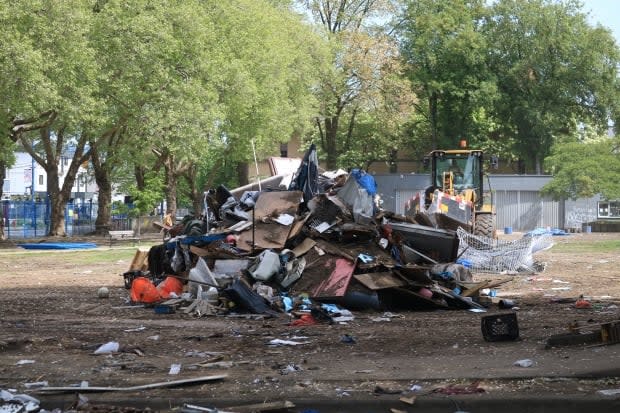Can B.C. cities prevent homeless camps in the future? Not easily, say observers

The B.C. government announced a new agreement with the City of Vancouver and Vancouver Park Board on Tuesday to end the homeless camp at Strathcona Park and prevent similar encampments in the future.
The memorandum of understanding, signed by representatives of the three levels of government, repeats the goal of shutting down the Strathcona camp by April 30, and clarifies the roles the province, city, and park board will take.
The agreement is similar to the one recently reached between the province and the City of Victoria — where officials have grappled with the issue of homeless camps, especially one established at Beacon Hill Park.
According to the agreements, the April 30 date for clearing out the parks where homeless people have been living rests on enough permanent and temporary housing being available for the parks' residents.
Last week the province announced it had bought three more hotels to help house people, including the Patricia Hotel on East Hastings Street.
But after years of perpetual homeless camps, observers question whether shutting down the current camps can result in a successful so-called "encampment zero" policy.
'They'll be on the street again'
"I think it's impossible to achieve," said Anna Cooper, staff lawyer with Pivot Legal Society.
"For a short period of time you'll have some people indoors," said Cooper. "Then a bunch of people — that housing won't work for them — they'll be evicted, they'll be banned from a shelter, they'll be on the street again."

Cooper also worries about the hundreds of other homeless people who aren't living at Strathcona Park, and won't be included in this effort to house people. She predicts before long, people will again gravitate to an encampment type of situation.
University of Victoria researcher Bernie Pauly doesn't think there will be enough housing available in the province's capital by the end of the month, despite the promise of 280 supportive housing units coming to the area.
She said she's concerned about public reaction when they inevitably still see unhoused people in Victoria in May.
"My biggest worry is that, you know, some of the backlash is going to land on homeless people instead of on governments," said Pauly.
Pauly told CBC's On The Island on Wednesday that she also worries the province will put people into shelter-like settings in Victoria if they do not have enough individual units by April 30 and that while there would be health and safety measures in place, multiple people living together could create more opportunities for the virus to spread.
"We have a serious situation when we are placing people into congregate settings," she said.
'So little housing'
Sarah Blyth, executive director of the Overdose Prevention Society (OPS) and former park board chair, is more optimistic that large camps can be avoided once the current ones are cleared, but not without major work.
"There's always camps that are going to pop up as long as there's not enough housing, but we can kind of get a hold on the situation as long as we sort of nip it in the bud," she said.

Blyth said in her work at OPS, there are constant requests for help connecting people with housing.
"I have people begging me for housing all the time. It's really challenging," she said. "There's so little housing for people right now."
She said homelessness is always going to be an issue, but if enough outreach resources are involved, people can be helped quickly if they're found to be setting up tents in parks.
Housing investments
For Penny Gurstein, a professor at UBC's School of Community and Regional Planning, the recent investment in housing by the provincial government is a reason for hope.
But while Gurstein said she's hopeful the effort by government could result in an end to large homeless camps, she stopped short of saying she is optimistic.
"The issue is not what the government is doing, the issue is that the homeless population is growing because of the precarity of people's lives right now," she said, highlighting a broader issue of housing affordability — or a lack thereof.

"It's pretty dire right now, people are living in very difficult situations," said Gurstein.
Cooper not only questioned whether eliminating encampments is possible in cities, she also questioned the approach, arguing it doesn't serve the homeless people whose lives hang in the balance.
"A zero encampment policy does not sound fundamentally caring, rights-based or dignified. That sounds like increased policing of unhoused people and forcing them out of the public eye," she said.
Do you have more to add to this story? Email rafferty.baker@cbc.ca
Follow Rafferty Baker on Twitter: @raffertybaker

